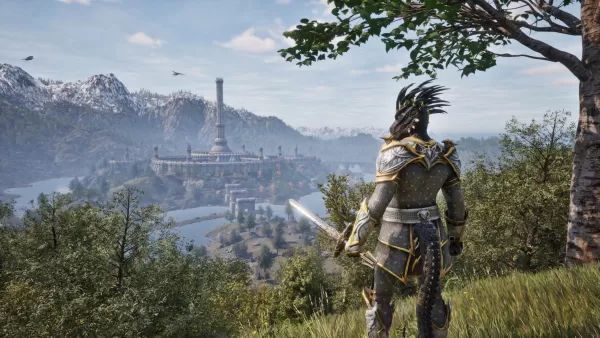By Azura, by Azura, by Azura – the rumors were true. Yesterday, Bethesda set the internet ablaze by finally unveiling Virtuos' remaster of The Elder Scrolls IV: Oblivion. An 'Elder Scrolls Direct' event culminated in a surprise shadow-drop, which instantly saw hundreds of thousands of players jumping in. This moment of global excitement feels like a much-needed beacon of hope for Bethesda Game Studios, especially after recent challenges. From the years-long efforts to repair the damage caused by Fallout 76's rocky launch to the lukewarm reception of their new sci-fi venture, Starfield, fans have been questioning whether Bethesda has lost its touch. With fierce competition from RPGs like Larian Studios' Baldur's Gate 3 and Obsidian's The Outer Worlds, which have both been hailed as spiritual successors to Elder Scrolls and Fallout, Bethesda's next big releases – Elder Scrolls 6 and Fallout 5 – are still years away. However, this re-release of Oblivion might just be the step in the right direction that fans have been craving, albeit not in the way they might expect.
At its peak, Bethesda Game Studios was a powerhouse in the RPG genre. In 2020, leaked Microsoft FTC documents revealed that Fallout 4 had sold 25 million units to date, with over 5 million units sold in its first week alone, according to VGChartz. In 2023, Todd Howard announced that Skyrim had surpassed 60 million sales, a number bolstered by its numerous re-releases. In contrast, Starfield has only managed to sell just over three million units a year and a half after launch. While Game Pass subscribers and the absence of a PlayStation release may skew these figures, the numbers are still a letdown for Bethesda. Even Starfield's dedicated fanbase has expressed disappointment with its first expansion, Shattered Space.
This situation poses a significant challenge for the developer. With The Elder Scrolls 6 still "years away" and Fallout 5 little more than a rumor, how can Bethesda recapture the hearts of its fans? The answer may lie in revisiting its storied past.
Rumors of the Elder Scrolls IV: Oblivion remaster began circulating in September 2023, when leaked Microsoft documents hinted at several unannounced Bethesda projects, including a remaster of the 2006 classic. The buzz continued until January 2025, when a former Virtuos employee spilled more details, stirring debate among Elder Scrolls fans. Finally, last week, the news broke early, igniting the internet – Google searches for 'The Elder Scrolls VI: Oblivion' surged by 713% in the last week alone, reaching over 6.4 million. At its peak, Bethesda's reveal livestream drew over half a million viewers. Despite the leaks, or perhaps because of them, more than 600,000 tuned in to see a 19-year-old game re-revealed. The overwhelming demand caused discount game key websites like CDKeys to crash, and slowed down Fanatical and Green Man Gaming. As of yesterday, Steam reported 125,000 concurrent players, with the game securing the #1 spot on the best-seller list. The fervor for Oblivion is as intense as the flames that pour from the Oblivion gates.
The message from players is clear: if you (re)build it, they will come. What better way to keep fans engaged and invested during these long development periods than to invite them back to the mysterious isles of Morrowind or the post-apocalyptic landscapes of the East Coast? From a business perspective, it's a smart move. While Bethesda's main team focuses on new projects, trusted partners like Virtuos can create remasters in shorter time frames using existing blueprints. These remasters have a built-in audience and can introduce a new generation to the rich worlds of Tamriel or the Fallout universe.
Bethesda has already leveraged its catalog successfully once before. During the first season of the Fallout TV show on Prime Video, Fallout 4 was discounted by up to 75%, accompanied by a next-gen update that included elements from the show. As a result, Fallout 4 sales skyrocketed by over 7,500% in Europe alone, despite being nearly a decade old.
 Oblivion Remastered offers a visit to the past that looks like the future. Image credit: Bethesda / Virtuos
Oblivion Remastered offers a visit to the past that looks like the future. Image credit: Bethesda / Virtuos
Looking back at Microsoft's leaked Bethesda roadmap, many noted that a Fallout 3 remaster was slated to follow Oblivion two years later. Although the original timelines have shifted – Oblivion was initially planned for fiscal year 2022 – if the intervals remain consistent, a Fallout 3 remake could be expected in 2026, coinciding with the second season of the Fallout TV show. Given the show's focus on New Vegas for its second season, could Bethesda be planning a surprise New Vegas remake? The synchronicity between the first season and Fallout 4's vibe suggests that Bethesda might have something up its sleeve for the New Vegas-centric season. After shadow-dropping Oblivion, a New Vegas Remastered trailer at the end of Fallout Season 2's finale isn't out of the question.
The message from players is clear: if you (re)build it, they will come. However, if there's one game in Bethesda's catalog that truly deserves a remake, it's The Elder Scrolls III: Morrowind. Fans have been clamoring for this for years, with some even remaking it using Skyrim's tools, as seen in projects like Skyblivion. Yet, Morrowind presents unique challenges for remaking. It stands at the crossroads of Bethesda's evolution, built differently from modern Elder Scrolls games. It's partially voiced, with much of the story conveyed through text, no quest markers, and combat without physics. While Virtuos managed to overhaul some of Oblivion's systems, Morrowind's core is inherently finicky. Remaking it is a delicate balancing act: modernize too much and you risk losing its original magic; retain too many outdated mechanics, and it might feel like a slog.
When a studio is synonymous with a gaming genre, the challenge is to innovate while retaining its audience. Rockstar Games has kept Grand Theft Auto fans engaged for over a decade with GTA Online, which supports the massive budget for GTA 6. Bethesda's strength lies in its richly detailed, single-player worlds – a quality not fully captured by Elder Scrolls Online or Fallout 76. The overwhelming response to Virtuos' Oblivion remaster shows that fans are eager to revisit Bethesda's classic titles. While not every remaster guarantees success – as seen with Rockstar's GTA Definitive Editions – a well-executed remaster like Oblivion's offers Bethesda a promising way to reconnect with its audience and rekindle the magic of its iconic RPGs.














